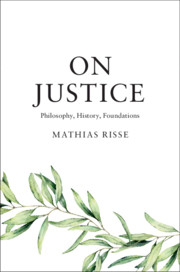Refine search
Actions for selected content:
4 results

On Justice
- Philosophy, History, Foundations
-
- Published online:
- 18 September 2020
- Print publication:
- 10 September 2020
12 - Pluralist Internationalism
- from Part II - Distributive Justice
-
- Book:
- On Justice
- Published online:
- 18 September 2020
- Print publication:
- 10 September 2020, pp 246-266
-
- Chapter
- Export citation
Introduction
-
- Book:
- On Justice
- Published online:
- 18 September 2020
- Print publication:
- 10 September 2020, pp 1-11
-
- Chapter
- Export citation
15 - The Ontology of Grounds of Justice: Elaboration and Comparisons
- from Part III - The Grounds of Justice
-
- Book:
- On Justice
- Published online:
- 18 September 2020
- Print publication:
- 10 September 2020, pp 306-319
-
- Chapter
- Export citation
